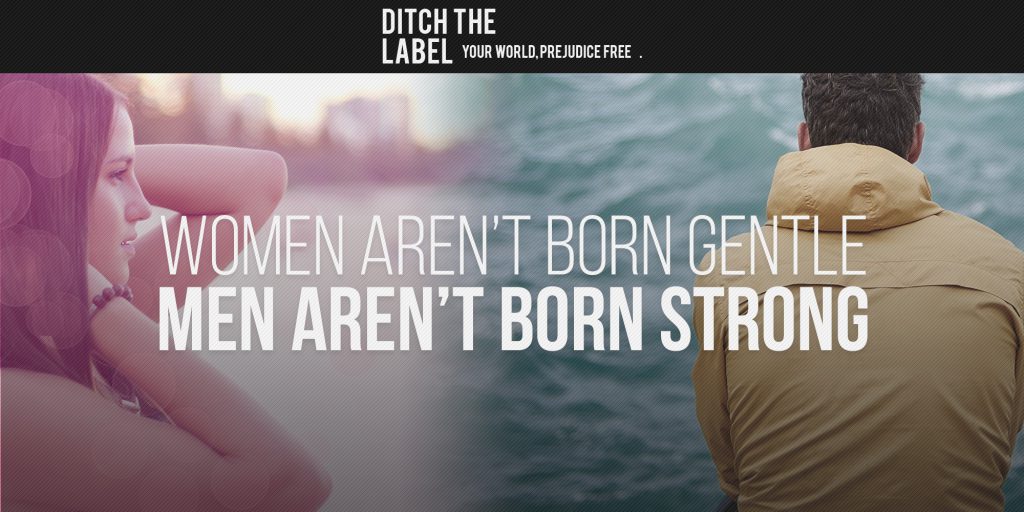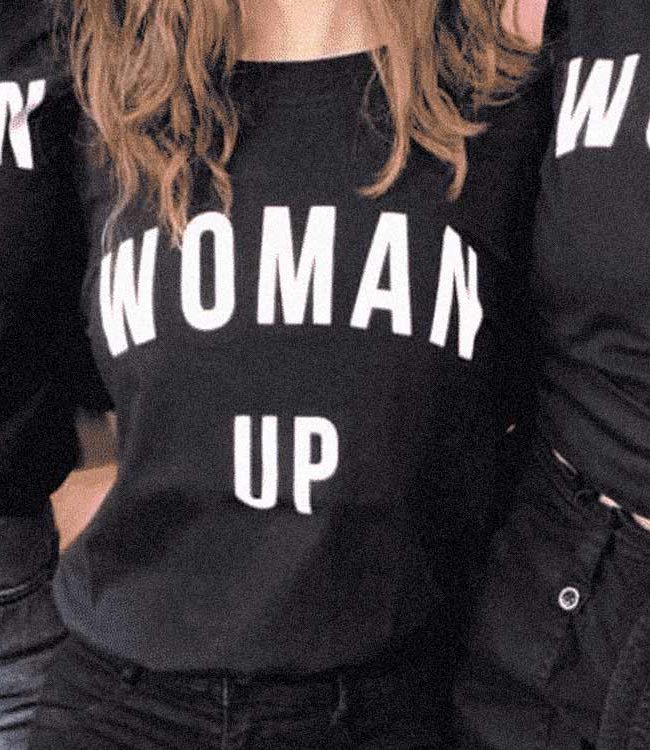Women aren’t born gentle and men aren’t born strong
Gender has become a topic of ongoing discussion internationally and whilst progress has been made it’s clear that our vision for true gender equality has not yet been realised. Our 2015 ‘Annual Bullying Survey’ drew attention to a worrying statistic which highlighted how nearly a quarter of young people who experienced bullying cited attitudes towards their perceived levels of masculinity and femininity as an aggressor for the behaviour.
We have consistently found that young people are restricted by gender stereotypes and face considerable social consequences for not conforming to them. The Gender Report 2016 allowed us to explore the lived experience of gender and young people’s attitudes towards notions of masculinity and femininity. Through examining the role gender stereotypes play in constructing young people’s identities and the implications they hold for their experience of education and career prospects we gained valuable insight into the inequalities our generation faces.
When respondents were asked to describe masculinity and femininity, we found there was international agreement that femininity was a measure of being gentle, well presented, friendly, family orientated and approachable. Conversely, there was much more variance in the descriptors young people chose to define masculinity. This suggests that young people find it easier to define and articulate the meaning of masculinity which raises questions about the freedom young women have to construct their own identities.

Our research findings imply that gender stereotypes, which are deeply ingrained in our society, construct female personalities more prescriptively than for males, therefore highlighting a constraining patriarchal inequality that weakens a woman’s flexibility in choosing her own identity. However, The Gender Report also drew attention to our finding that all cultures appeared to heavily associate strength with masculinity which again highlighted international conformity to problematic gender stereotyping. This poses serious limitations to men’s identity construction too that could be indicative of the harmful consequences men face if they don’t identify with this descriptor.
Pressure to conform to gender stereotypes can have serious implications for a young person’s mental health. For example, CALM have found that the biggest killer for men aged between 20 and 45 in the UK is suicide and there is a clear correlation between the pressures imposed on men to be ‘manly’ and the experience of mental health issues.
At Ditch the Label, we know that your gender doesn’t determine your personality, a woman isn’t born gentle and a man isn’t born strong, behaviours are learnt and these identities have been constructed for us, but we know this can change.
Interestingly, our research highlighted that despite the gendered expectations imposed on our personalities, a significant number of respondents in the UK saw themselves as being somewhere in the middle of masculinity and femininity which may be suggestive of young people’s internal experience of gender as a spectrum rather than as a fixed identity. This finding was particularly promising as it encourages young people to view their own individuality and suggests a breaking away from gender stereotypes. However, there was still a great deal of conformity that remained amongst male and female respondents as well as individuals who identified as trans*, which indicates that the gendered experience still holds particular significance to these groups.
Our research aimed to explore whether young people believed personality was gender specific and this highlighted some problematic perceptions that need addressing. For example, the majority of respondents believed that women were more compassionate and emotional than men. This then constructs the experience of emotions as female which can, in turn, pose serious problems for a man’s mental health. In addition, by defining compassion as a female characteristic we may deter men from performing roles associated with empathy, such as professions like nursing and childcare, which may be indicative of the overrepresentation of women in these careers. Constructing women as emotional can also be particularly disempowering as our society tends to devalue these qualities and can create false images of women being irrational and unstable. This finding also highlights how society imposes an unfair burden on women by expecting them to be compassionate, which is rooted in archaic gender stereotypes that limits a woman’s role to caregiving and childbearing.
It’s concerning that women in the 21st century may still experience a sense of moral failing if they don’t present themselves as compassionate and emotional. In fact, we found that 44% of young people had been treated unfairly for not conforming to gender stereotypes. This is hardly surprising if we consider how gendered assumptions and prejudice attitudes are internalised and reproduced in our society.
But what are the consequences of gendering our personality traits? Well, if we consider our finding that young people believe women are more family orientated than men, we can see what implications this may have on gender equality. For example, whilst the last 60 years have seen a huge influx in women entering the workforce, by continuing to identify them with the family we’re imposing a double burden upon women where they are often expected to complete a second shift at home (of childcare, housework and emotional labour) after a day of (often underpaid) work.
Defining men outside of the family poses additional problems to our illusion of gender equality. For example, the work of single dads is often devalued and the parental rights of men repeatedly overlooked. Seeing women as more family orientated than men also puts more emphasis on men having a successful career. This is particularly problematic as not only is male unemployment at an all-time high, but changes in the labour market (e.g. advances in technology) have meant many blue collar jobs (previously associated with working-class men) are disappearing, leaving many male identities feeling fractured and also at risk of developing mental health issues. Separating men from the family also denies them of the fulfilment they may experience from being in the home and as well as overlooking the benefits the rest of the family could get from their increased involvement in it.
We found that gender inequality extended well beyond the home though, which became apparent when we measured whether young people thought careers were gender specific or not. The gender report highlighted how young people believe that men were better at legal and political jobs than women. This belief mirrors women’s underrepresentation in legal and political professions. Whilst we have experienced a big increase in women and minorities entering legal professions, women are still underrepresented at its top levels. Similarly, despite a number of international efforts to increase women’s participation in all levels of government, women are still vastly underrepresented in politics too – as Caroline Lucas recently referenced in her Ditch the Label blog. This could be indicative of our finding that young people believe women are more closely associated with family life. By assuming woman’s proper sphere is the ‘private’ one you construct a man’s role within the ‘public’ domain that’s associated with political authority contestation which mirrors the personality traits (e.g. strength and dominance) that young people closely identify men with.
Our findings also mirror men’s overrepresentation in sport and business. Only 1% believe that women are better at sport than men. The last year has been a great year for women’s sport, with England’s women’s’ football team winning the quarterfinals in the world cup, for example. But despite such achievements and brilliant campaigns like ‘This Girl Can’ working towards getting more women into sport, these young people’s views reflect how women’s sport has a long way to go before it joins men in the mainstream. Similarly, whilst more women are breaking into business, we are still missing an equal representation of female business leaders in companies. Perhaps our finding that femininity is associated with being gentle, well presented, friendly, family orientated and approachable, is by definition, excluding women from this domain. Our research demonstrates how these assumptions about women have been internalised young people largely believe that men are better at managing a business than women.
Reflecting upon the findings from the gender report, it’s no surprise that 35% of teenage girls and 63% of trans people believe their gender will have a negative effect on their future career prospects. It’s clear that inequalities in the labour market extend far beyond the ‘pay gap’ that has become such an important point of discussion this year.
More needs to be done to promote gender equality, diversity and inclusion, especially within subjects, career pathways, lifestyles and interests. Are we afraid of young people’s identities deviating from the accepted stereotypes of masculinity and femininity? Well, women aren’t born gentle and men aren’t born strong so it’s about time we get over that fact and start reshaping our society accordingly. Instead, let’s champion young people’s right to define their own identities free from society’s outdated and limiting gendered expectations. Let’s start celebrating the strengths of our world’s diversity and embrace the possibilities a future of equal representation could bring. This world needs to hear all of our voices and gender will no longer define our potential.
This article is written in response to The Gender Report 2016 – click here to view it.
Sorry, the comment form is closed at this time.















Helen Webberley
This is such an important article. I am hoping that over the next decade our society’s reaction to gender issues catches up with that of race, religion, culture and sexuality. I love the concept that we are not right or left, black or white, male or female. I am a doctor and see (and help) everyone on every spectrum. I have a video which explains the sepctrum / sphere concept here http://bit.ly/gender-spectrum
christine
Like it or not parents are mainly responsible for this (some of it is school also) So its not just media.
A lot of parents bring their children up with these gender distinctions without realising it! We are already putting them into ‘a role’ as we tend to buy girls pinks frilly clothing; toy prams, dolls, cooking sets etc Boys tend to get given cars garages action figures etc So we are already moulding our children from birth My grandson is two and already wants action figures because he sees other boys including his; mainly boy; cousins playing with them. My son plays (gentle) football with him and so I think that mostly he’s already determined his place in the world as he will obviously identify with other boys. and make them his peers just to get a sense of who he is But that’s not to say he wont play with girls too. But he’s already trying to define himself as a boy and obviously he wants to get a sense of what BOYS do.
We cant suddenly change how we bring up our children (I would imagine that would take decades!); and we can’t make them into something else; but we can teach boys gentleness and teach girls toughness or whatever we want. My grandson gets taught manners and how to share and be nice to others. Parents are the role models who have most of the control over what their children learn and how they behave so lets not forget that. Ultimately its up to us to set the guidelines for our kids and teach them not to be swayed by so called gender definitions.
no more coffee and sugar
Frankly, I think seeing masculinity (strength) and femininity (fashion) as a dichotomy, or as a spectre, is a mistake. Way I see it, they are separate things, and they aren’t necesarily mutually exclusive. Moreover, both might be absent, actually. Some people are very masculine and very feminine at the same time. Me on the other hand… I’m not particularly masculine NOR particularly feminine. Im more of an aloof gamer nerd more than anything else, and the fictional character I identify the most with is L from death note.
Kipper Parrish
Of course women aren’t born gentle and men strong, lots of that is puberty lol